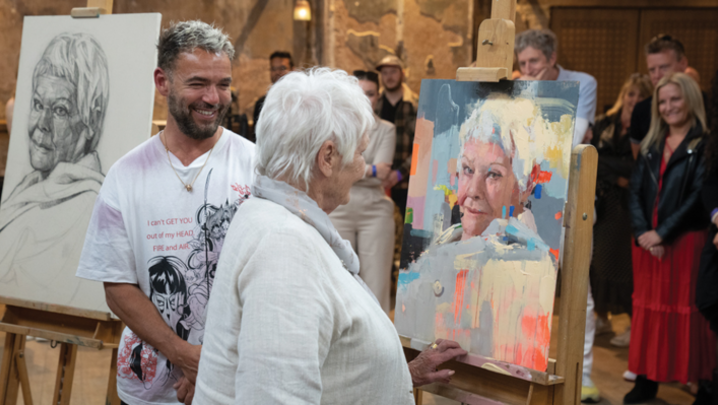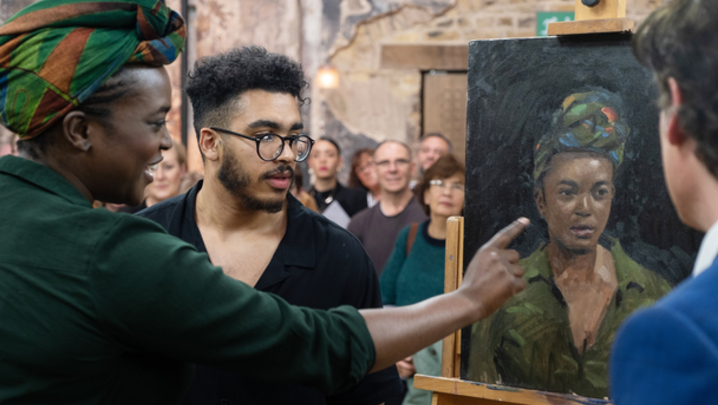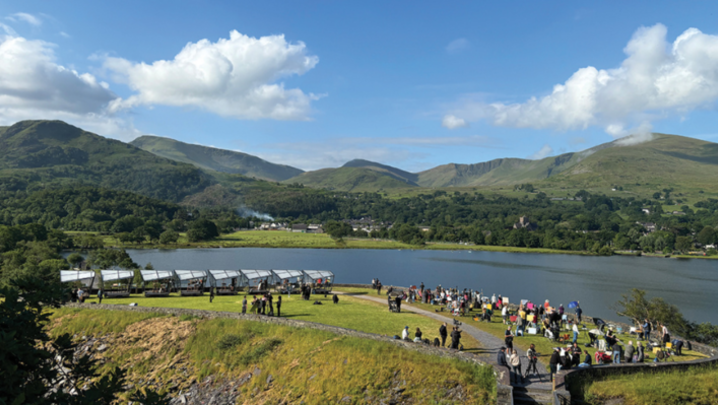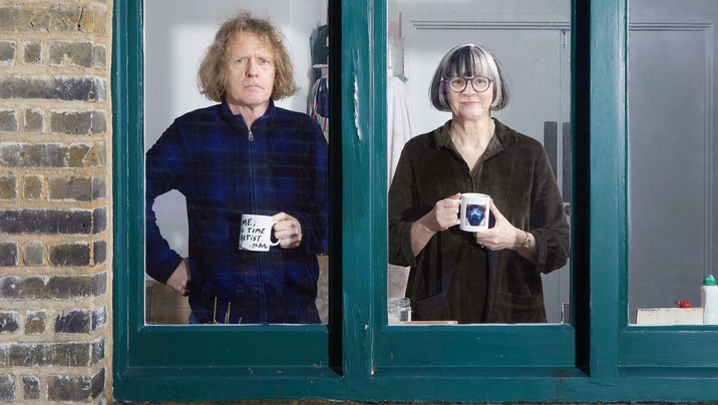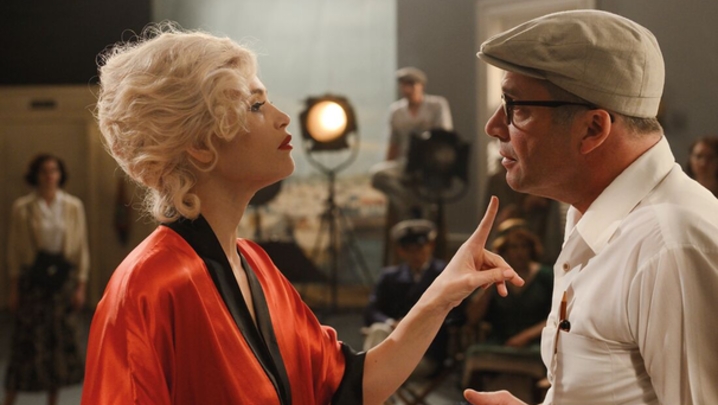Phil Edgar-Jones convinces Tara Conlan that Sky Arts is making a bigger splash as it scales up across Europe
Just over 10 years ago, Sky took control of the struggling Artsworld channel and subsequently re-branded it Sky Arts. A decade on, it is the home of The South Bank Show and is renowned for its star-studded programmes. These shows have included Jon Hamm and Daniel Radcliffe in A Young Doctor’s Notebook, and Joseph Fiennes as Michael Jackson in the forthcoming one-off, half-hour comedy drama Elizabeth, Michael & Marlon. Not forgetting the pan-European search for the best new photographer in Master of Photography, due later this year, and fronted by Isabella Rossellini.
A year ago, Sky Arts Director Phil Edgar-Jones oversaw the reduction from two to one arts channels and an improved slot higher up the Sky EPG.
The jovial Scot, who was Creative Director of the company that made Big Brother and the BBC Two show Celebrity Art School – Remarkable Television – says the net result of these changes has been successful.
He explains the rationale: “There didn’t seem to me to be much logic to having two channels, in the modern age, when people consume things more on demand.”
Unusually, cutting two channels to one gave him more money overall (Sky does not reveal budgets). A new, dedicated, on-demand section was also created. This saw the consumption of Sky Arts content rise by 108% in the period July 2015 to April 2016, compared with the same period a year earlier, says Edgar-Jones.
“What it told us, and this was something that I knew, is that arts are interesting subject matter in many ways.… Few people like all the arts,” he adds. “They tend to come and cherry-pick the things they’re interested in.
“Your opera fan doesn’t necessarily go on to watch country music and vice versa, so on-demand works well. There’s a classical tab, a rock-music tab, a ballet tab, and so on. If people like a particular genre or artist, they can find it much more easily.”
He continues: “A lot of people with Sky Arts will sit on the sofa on a Saturday and create their own schedule for the week. It’s the kind of content that, if you’re serious about it, you’ll find space in your evening or weekend to watch all you can.”
One of the benefits of Sky taking full control of Sky Italia and Sky Deutschland has been the creation of the Milan-based Sky Arts Production Hub – a cross-border collaboration that has given birth to documentary series Artists in Love and Mystery of the Lost Caravaggio.
Edgar-Jones explains: “Once the three Skys joined up, one of the first initiatives to get us working together was Sky Arts. We wanted to establish a way of working, so that we could scale things up a bit. We didn’t want to end up with some awful Euro-porridge that didn’t work.
“So we drew a Venn diagram and worked out where we were different and where we were all the same. It’s been brilliant for me. We get together once a month and talk about content.”
His German colleagues are visiting the Sky Arts office in west London when we speak.
“The real ambition is to create work that can have a life outside the channel. It’s not just being a television channel.”
Pretty much everything that the hub has made so far has come from Italy, but Edgar-Jones says “they’ve started to engage more with UK producers to collaborate with some Italian directors for the next raft of content we’re developing”.
Some Sky Arts shows are too parochial to cross borders. There was a documentary on Shane MacGowan’s teeth and one on The Jam. “They don’t have the resonance in Italy or Germany, so they wouldn’t necessarily take it,” admits Edgar-Jones. Equally, he “would draw the line at obscure German gardens”.
The appeal of Italian renaissance art is much broader. Sky Arts has an Italian season coming up, which its boss says “is stunning… and is probably bigger than we could have done ourselves. That’s the advantage of it. Some of it won’t work and some of it will.”
Playhouse Presents, a series of single, studio-based plays, is a prime example of Sky Arts’ originality. It gives people behind the scenes and in front of the camera the chance to “do something that no one would commission elsewhere”, claims Edgar-Jones.
Emma Thompson, David Tennant, Idris Elba, Hamm and Radcliffe are among the stars who have played roles in Playhouse Presents since the strand began in 2012.
“I think people genuinely enjoy working for Sky Arts,” says Edgar-Jones, partly because of the freedom they are given. However, he concedes: “It’s difficult to get commissioned, as we’re very picky. I would love to do everything, but you have to make difficult choices sometimes. We get contacted a lot by incredible people who want to come and work with us, and that’s nice.”
Forthcoming Playhouse Presents episodes revolve around urban myths. One is about Bob Dylan visiting a house in London that he thinks is the home of Dave Stewart of The Eurythmics, but which turns out to belong to a different Dave. Another concerns Cary Grant and LSD.
Meanwhile, the new series of the Melvyn Bragg-fronted South Bank Show includes interviews with Russell T Davies, poet Jackie Kay and Jamaican musicians Sly & Robbie.
No one doubts that Sky Arts aims to be viewer-friendly as well as ambitious. “The word ‘arts’ can be challenging for some people,” admits Edgar-Jones. “You’ve got to think: not all art is accessible and, in a way, it doesn’t have to be, because there are small, passionate audiences for very niche things.”
But, he says, “The real ambition is to create work that can have a life outside the channel. It’s not just being a television channel.”
This is a reference to Beyond the Fence, a musical created using algorithms, which ran at the London Arts Theatre this spring.
Edgar-Jones calls it “a collaboration of science and data… these are things that we are doing that have real-world resonance, not just for TV.”
Despite this, recording live performances – such as Simon Rattle conducting at The Barbican – is important, too. And not only for audiences to enjoy, but for the historical record.
“Imagine that you could have filmed Beethoven recording his own symphonies.… It’s important to preserve some things for the future in digital form. Sky Arts should be the home of genius,” he declares, pointing to a recent collaboration with Enda Walsh on his theatrical opera The Last Hotel, which allowed the playwright to play with form.
Cutbacks at the BBC have inevitably hit BBC Four, regarded as Sky Arts’ biggest rival – though, as Edgar-Jones points out, “We’re pretty much the only dedicated arts channel”.
He praises the BBC’s arts coverage – “Its Shakespeare season looks fantastic, it has the Proms, it has Radio 3” – but adds: “I’d like the BBC to do more arts. The more successful it is, the better it is for everyone.”
Although churn is up slightly, according to Sky’s latest figures, the kind of audiences that Sky Arts brings in are important for the overall brand.
“Each of the channels here has its job to do and reaches a slightly different audience,” says Edgar-Jones. “Certainly, all the evidence suggests that Sky Arts is a highly valued part of the portfolio. Not by everyone who subscribes to Sky, but there’s a significant audience watching the channel who value the fact that it’s there.”


